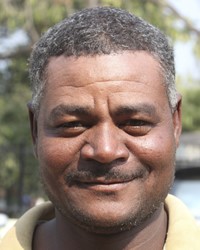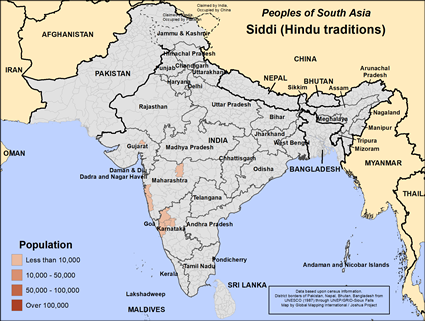Siddi (Hindu traditions) in India

Photo Source:
Kandukuru Nagarjun - Flickr
Creative Commons
|

Map Source:
People Group data: Omid. Map geography: UNESCO / GMI. Map Design: Joshua Project
|
| People Name: | Siddi (Hindu traditions) |
| Country: | India |
| 10/40 Window: | Yes |
| Population: | 9,700 |
| World Population: | 9,700 |
| Primary Language: | Kannada |
| Primary Religion: | Hinduism |
| Christian Adherents: | 31.03 % |
| Evangelicals: | 0.00 % |
| Scripture: | Complete Bible |
| Ministry Resources: | Yes |
| Jesus Film: | Yes |
| Audio Recordings: | Yes |
| People Cluster: | South Asia Tribal - other |
| Affinity Bloc: | South Asian Peoples |
| Progress Level: |
|
Introduction / History
Siddi (also known as Sidi, Sheedi, Habshi, or Afro-Indians) are an ethnic group in India descended from the Bantu peoples of East Africa. Most of their ancestors are from what is now Kenya, Mozambique, and Tanzania.
Some came as slaves starting in the 600s. Others came as soldiers, merchants, or servants of the Arabs, Portuguese, or British. Malik Ambar was a prominent Siddi military leader in the Deccan region. They have Indian citizenship. Most live in India's western states of Gujarat, Maharashtra and Karnataka. Their original language, Siddi, was related to Swahili, but various Indian languages are replacing it.
What Are Their Lives Like?
Today, many Siddis are farmers and livestock herders. They fish and collect forest produce such as cinnamon, tamarind, and honey.
Others make a living by making and selling baskets and bamboo furniture. They might be blue collar workers or employed by the government.
Because of their ties to Africa, some Siddi folk dances blend African and Indian elements. For example, there is the Siddi Goma, a rhythmic dance performed at festivals. They play Africa drums and instruments such as dammam, duf, and gumte. Oral storytelling preserves their African past.
Siddi families are usually nuclear, and they have close-knit villages. Siddi families are typically nuclear, with strong community bonds.
What Are Their Beliefs?
About two-thirds are Hindu, but their form of Hinduism has African elements. They worship Yallamma, a Hindu goddess. The remaining third are Christian.
What Are Their Needs?
They are marginalized, often treated similarly to Dalits. They face colorism and caste-based discrimination, despite not practicing caste hierarchy themselves.
Prayer Points
Pray for the Siddis to put their identity in Christ rather than their ethnicity.
Pray for the Holy Spirit to bless Siddi families, villages, and churches.
Pray for the Lord to use Siddi Christians to extend Christ's Kingdom throughout India.